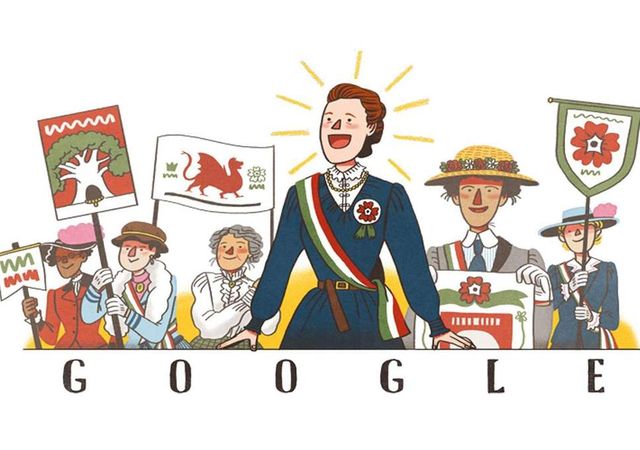Google is celebrating the 171st anniversary of suffragist Millicent Fawcett’s birthday with a Doodle. But, who is she?
Fawcett is considered one of the most influential people in the women’s suffrage movement in Britain. According to the Independent, she has also been described as one of the most influential feminists of the past 100 years. The colors for her movement, which are represented in the doodle, were green, white and red, which stood for “Give Women Rights.”
Fawcett was a feminist from a young age. During her childhood, Fawcett’s sister Elizabeth Garret Anderson—who later became Britain’s first female doctor—introduced her to Emily Davies. Davies was a trailblazing British feminist fighting for the right to vote and women’s right to university access.
When she was 19, Fawcett heard a speech by the radical Member of Parliament, John Stuart Mill, who was an early supporter of universal women’s suffrage. Inspired by his politics, Fawcett became involved in his campaign and was the secretary of the London Society for Women’s suffrage.
By 1867, Millicent had gotten married and had a daughter, but this did not stop her lifetime of activism. In 1868, she joined the London Suffrage Committee and spoke at the first public pro-suffrage meeting which was held in London. Fawcett formed the National Union of Women’s Suffrage Societies in 1897, which was the largest organization of its kind, and it founded as being a non-violent group of activists. Fawcett was the president of the organization until 1919. She also established the International Women’s Suffrage Alliance to bring together women all over the world who were fighting for the right to vote.
Her other notable achievements include helping to found the all-women Newnham College at Cambridge University’ lobbying for the criminalizing of incest and child abuse; lobbying for the repeal of the Contagious Disease Act, which had a negative impact on sex workers; and investigating Britain’s use of concentration camps in South African during the Boer War.
She died in her home in 1929—one year after all women over 21 were granted full voting equality in Britain.
 Millicent Fawcett was recently honored with the unveiling of a statue in Parliament Square in London. In that statue she is holding up a piece of one of her most famous quotes “courage calls to courage everywhere, and its voice cannot be denied.” via Wikimedia Commons
Millicent Fawcett was recently honored with the unveiling of a statue in Parliament Square in London. In that statue she is holding up a piece of one of her most famous quotes “courage calls to courage everywhere, and its voice cannot be denied.” via Wikimedia Commons
Top Image: Google Doodle
More from BUST
“Beyond Suffrage”: The Journey Of Women Activists From Suffrage To The Resistance
In The Early 1900s, Ladies Stabbed Harassers With Hatpins
How Women Are Using Color To Protest In 2018


